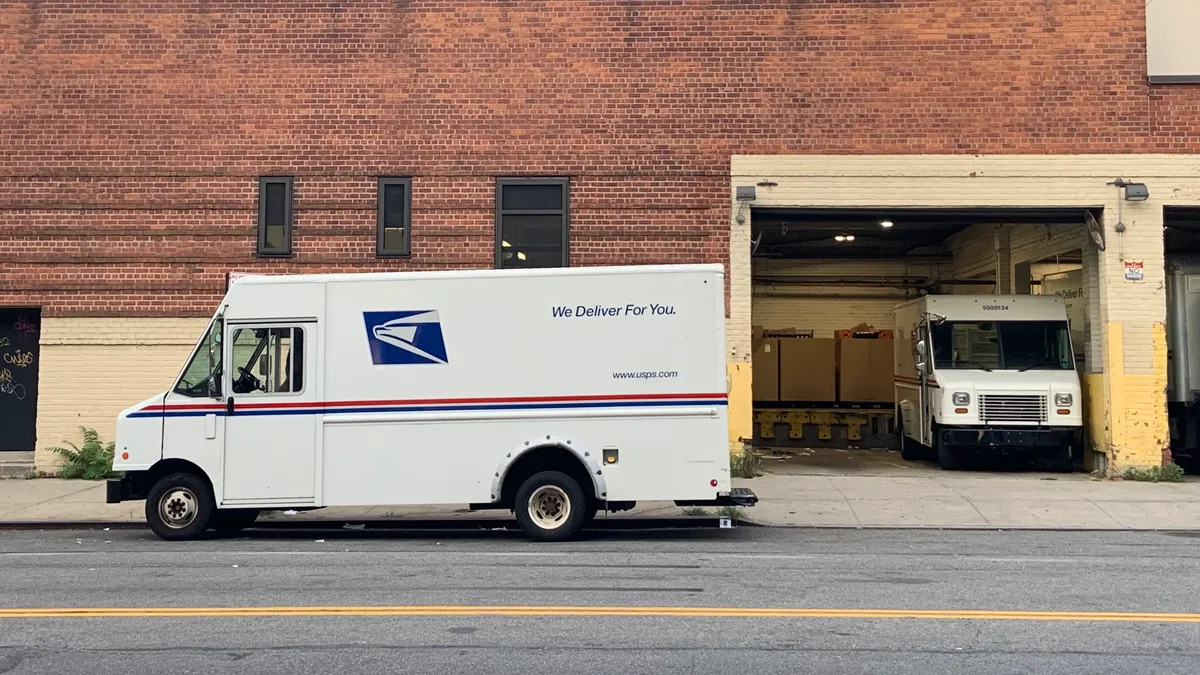Dive Brief:
- The U.S. Postal Service (USPS) has rolled out a pilot program that allows certain post office locations to offer expanded financial services to customers. New services include check cashing, bill pay and ATM access, as well as upgraded money orders and wire transfers, NBC News reported Monday.
- The pilot program — which began Sept. 13, a Postal Service spokeswoman, told NBC in an email — is running in Washington, D.C.; Baltimore; Falls Church, Virginia; and the Bronx in New York City.
- The pilot program was not explicitly mentioned in the 10-year plan the Postal Service announced in May. However, it will expand financial services to many underbanked low- to-moderate income (LMI) Americans, in accordance with the agency’s goal to "adapt the Postal Service to the evolving needs of the American people and address our obligation for financial sustainability," USPS Board Chairman Ron Bloom said.
Dive Insight:
Under the pilot, customers can bring payroll or business checks up to $500 to participating post offices to buy single-use Visa gift cards. The pilot program also lets customers make bill payments and access ATMs at post offices.
The Postal Service is set to expand the program to other locations after the holiday season, The Washington Post reported Monday.
Postal banking, which was once widespread in the U.S., could make financial services more accessible to millions of Americans. A University of Michigan study published in May found 69% of census tracts with a post office do not have a community bank branch.
In lacking postal banking, the U.S. is a bit of an outlier, according to the American Postal Workers Union (APWU), which is collaborating with the USPS on the pilot. As of 2018, 91% of postal organizations worldwide offered banking services.
Congress established the Postal Savings System in 1910, and the program officially launched the next year, attracting a number of immigrants by offering information in 24 languages and handing out leaflets at global ports, according to Slate. In 1915, recent immigrants owned more than 70% of postal bank deposits despite comprising 15% of the population, the publication reported.
Nationwide postal banking deposits peaked at $3.4 billion in 1947. But in the 1960s, postal banking deposits cratered as banks raised their interest rates and steadily regained public trust. Regulators abolished postal banking in 1966.
About 5.4% of U.S. households — 7.1 million — were unbanked as of 2019, the Federal Deposit Insurance Corp. (FDIC) found in a biennial survey. That figure is down from 6.5% in 2017 but may turn upward as a result of the COVID-19 pandemic. The numbers skew higher among communities of color, the Federal Reserve found this year. About 13% of Black adults are unbanked, according to the central bank, and 27% are underbanked.
Democratic lawmakers have sought to reintroduce postal banking for years. Sen. Kirsten Gillibrand, D-NY, introduced the Postal Banking Act in 2008, and has repeatedly argued for post offices to offer expanded financial services. Other lawmakers pushed the issue in relation to the COVID-19 pandemic. Sen. Sherrod Brown, D-OH, last year introduced a bill that would require banks to maintain "digital dollar wallets" so unbanked consumers could access stimulus payments. The bill would have let consumers set up "FedAccounts" at local banks and post offices. A 2020 appropriations bill passed by the House included an amendment to allocate $2 million for a postal banking trial program.
Postal banking doesn't appear to have much support from banking trade groups. The American Bankers Association, the Consumer Bankers Association, the Credit Union National Association and The Clearing House urged officials in a May paper to find alternatives to postal banking that include LMI consumers. The driver licenses or passports necessary to use such services may be expensive for some demographics, the groups argued.
The pilot also comes while the USPS is looking to cut costs and broaden revenue streams. The agency, led by Postmaster General and Trump administration appointee Louis DeJoy, is slated to lose $160 billion over the next 10 years, acording to The Washington Post.
In launching the pilot, DeJoy is "doing the least he can do," said Porter McConnell, founder of the Save the Post Office Coalition.
"What would it look like if there was a forward-looking postmaster general who was really strategic about new sources of revenue, serving new populations and building a post office into the community hub that it should be for the 21st century?" McConnell told NBC. "If you think about that, this all is a little less exciting."
The installation of ATMs in postal sites is not quite a novel idea. JPMorgan reportedly held preliminary discussions with the USPS to lease space for the bank’s ATMs.














